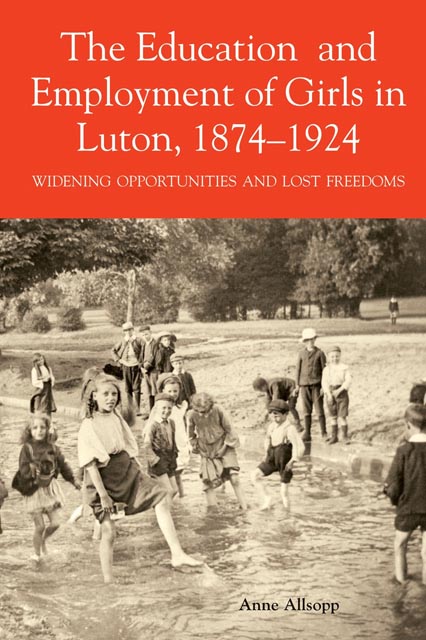Book contents
- Frontmatter
- Contents
- List of Illustrations
- List of Tables
- Dedication
- Acknowledgements
- Abbreviations
- Introduction
- Chapter One Luton: Scientiae et labori detur
- Chapter Two Further Perspectives Concerning Employment Patterns for Women
- Chapter Three Sunday Schools
- Chapter Four Education in the Time of the School Board
- Chapter Five Teaching: An Alternative Occupation
- Chapter Six Teacher Training and the Education of Students Aged Over Fourteen Under Bedfordshire County Council
- Chapter Seven Elementary Education 1903–1924
- Chapter Eight Rural Schools
- Chapter Nine Learning and Living
- Chapter Ten Secondary Education for Girls
- Conclusion
- Appendix
- Bibliography
- Index
Chapter Nine - Learning and Living
Published online by Cambridge University Press: 03 August 2023
- Frontmatter
- Contents
- List of Illustrations
- List of Tables
- Dedication
- Acknowledgements
- Abbreviations
- Introduction
- Chapter One Luton: Scientiae et labori detur
- Chapter Two Further Perspectives Concerning Employment Patterns for Women
- Chapter Three Sunday Schools
- Chapter Four Education in the Time of the School Board
- Chapter Five Teaching: An Alternative Occupation
- Chapter Six Teacher Training and the Education of Students Aged Over Fourteen Under Bedfordshire County Council
- Chapter Seven Elementary Education 1903–1924
- Chapter Eight Rural Schools
- Chapter Nine Learning and Living
- Chapter Ten Secondary Education for Girls
- Conclusion
- Appendix
- Bibliography
- Index
Summary
This chapter looks at the choices made by parents who did not wish to educate their daughters in non-denominational schools or who, for social reasons, chose to send their daughters to independent schools. Informal opportunities were also open to women and girls who were prepared to use their own initiatives, attributes which were very much in keeping with the character of people in Luton. Skills learnt in the home were also valuable, especially in the context of the hat industry. The contribution of these informal types of education was significant, but information is limited because very few records were kept. They are discussed here under the heading Learning and Living, which Harrison describes as learning ‘in terms of social purpose rather than institutional form’.
The first sections outline the provision of the Church and Nonconformists in elementary and Sunday schools. In the early days covered by this study the National Society supported New Town Street (St Paul’s), St Matthew’s, Queen Square, Stopsley, Church Street and Christ Church schools. The Quakers also provided substantially for the town: the endowed Langley Street School remained until the early days of the Board and independent provision on a small scale has been noted. However, their major contribution was probably the adult schools, which offered a similar kind of self-help to that found in the Sunday schools and appear to have been well supported. According to Dony, the Methodists set up schools in High Town and Chapel Street and also the Crown and Anchor School.
Adult education has been taken to mean not only education for adults but, as has been suggested by Gordon, Aldrich and Dean, as education for people who were not attending school on a formal, regular or full-time basis4 and for cultural, general, social, community or political interests.5 Several examples of this type of informal education, springing from personal or group initiatives are to be found. In the early days of the twentieth century, as employment prospects for girls began to widen, there was a need for secretarial training. Many girls with determination and initiative wanted to turn their backs on the local hat industry and move into office work but it appears that the evening classes held at the local secondary school did not meet this demand and Luton girls learnt their skills in private commercial schools.
- Type
- Chapter
- Information
- The Education and Employment of Girls in Luton, 1874-1924Widening Opportunities and Lost Freedoms, pp. 191 - 219Publisher: Boydell & BrewerFirst published in: 2023

